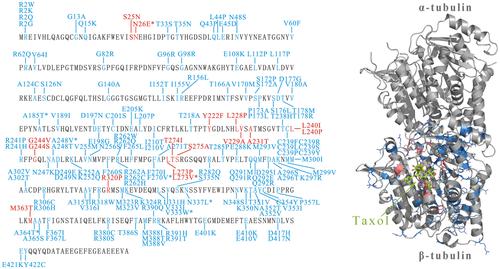当前位置:
X-MOL 学术
›
Chem. Bio. Drug Des.
›
论文详情
Our official English website, www.x-mol.net, welcomes your feedback! (Note: you will need to create a separate account there.)
Systematic profiling of Taxol resistance and sensitivity to tubulin missence mutations at molecular and cellular levels
Chemical Biology & Drug Design ( IF 3 ) Pub Date : 2024-04-04 , DOI: 10.1111/cbdd.14513 Lihua Zhou 1 , Xi Ding 1 , Jingjing Cao 1 , Yu Feng 1 , Yuqin Gu 1 , Ling Liu 1 , Rong Chen 1 , Dongyun Gao 2 , Xiaoling Chen 3
Chemical Biology & Drug Design ( IF 3 ) Pub Date : 2024-04-04 , DOI: 10.1111/cbdd.14513 Lihua Zhou 1 , Xi Ding 1 , Jingjing Cao 1 , Yu Feng 1 , Yuqin Gu 1 , Ling Liu 1 , Rong Chen 1 , Dongyun Gao 2 , Xiaoling Chen 3
Affiliation

|
Taxol (paclitaxel) is the first approved microtubule‐stabilizing agent (MSA) by binding stoichiometrically to tubulin, which is considered to be one of the most significant advances in first‐line chemotherapy against diverse tumors. However, a large number of residue missence mutations harboring in the tubulin have been observed to cause acquired drug resistance, largely limiting the clinical application of Taxol and its analogs in chemotherapy. A systematic investigation of the intermolecular interactions between the Taxol and various tubulin mutants would help to establish a comprehensive picture of drug response to tubulin mutations in clinical treatment of cancer, and to design new MSA agents with high potency and selectivity to overcome drug resistance. In this study, we described an integration of in silico analysis and in vitro assay (iSiV ) to profile Taxol against a panel of 149 clinically observed, cancer‐associated missence mutations in β‐tubulin at molecular and cellular levels, aiming to a systematic understanding of molecular mechanism and biological implication underlying drug resistance and sensitivity conferring from tubulin mutations. It is revealed that the Taxol‐resistant mutations can be classified into three types: (I) nonbonded interaction broken due to mutation, (II) steric hindrance caused by mutation, and (III) conformational change upon mutation. In addition, we identified three new Taxol‐resistant mutations (C239Y, T274I, and R320P) that can largely reduce the binding affinity of Taxol to tubulin at molecular level, in which the T274I and R320P were observed to considerably impair the antitumor activity of Taxol at cellular level. Moreover, a novel drug‐susceptible mutation (M363T) was also identified, which improves Taxol affinity by 2.6‐fold and decreases Taxol antitumor EC50 values from 29.4 to 18.7 μM.
中文翻译:

在分子和细胞水平上系统分析紫杉醇耐药性和对微管蛋白错失突变的敏感性
紫杉醇(紫杉醇)是第一个通过化学计量与微管蛋白结合而获得批准的微管稳定剂(MSA),这被认为是针对多种肿瘤的一线化疗中最重要的进展之一。然而,微管蛋白中存在的大量残基错别突变已被观察到导致获得性耐药,很大程度上限制了紫杉醇及其类似物在化疗中的临床应用。对紫杉醇和各种微管蛋白突变体之间分子间相互作用的系统研究将有助于全面了解癌症临床治疗中微管蛋白突变的药物反应,并设计出具有高效力和选择性的新型 MSA 药物来克服耐药性。在这项研究中,我们描述了计算机分析和体外测定的整合(硅V )在分子和细胞水平上针对 149 个临床观察到的、与癌症相关的 β-微管蛋白错失突变进行分析,旨在系统地了解微管蛋白突变带来的耐药性和敏感性的分子机制和生物学意义。结果表明,紫杉醇抗性突变可分为三种类型:(I)由于突变导致非键相互作用破坏,(II)由于突变引起的空间位阻,以及(III)突变引起的构象变化。此外,我们还发现了三种新的紫杉醇抗性突变(C239Y、T274I和R320P),它们可以在分子水平上大大降低紫杉醇与微管蛋白的结合亲和力,其中观察到T274I和R320P显着损害紫杉醇的抗肿瘤活性在细胞水平上。此外,还发现了一种新的药物敏感突变(M363T),该突变使紫杉醇亲和力提高了2.6倍,并降低了紫杉醇抗肿瘤EC50 值从 29.4 到 18.7 μM。
更新日期:2024-04-04
中文翻译:

在分子和细胞水平上系统分析紫杉醇耐药性和对微管蛋白错失突变的敏感性
紫杉醇(紫杉醇)是第一个通过化学计量与微管蛋白结合而获得批准的微管稳定剂(MSA),这被认为是针对多种肿瘤的一线化疗中最重要的进展之一。然而,微管蛋白中存在的大量残基错别突变已被观察到导致获得性耐药,很大程度上限制了紫杉醇及其类似物在化疗中的临床应用。对紫杉醇和各种微管蛋白突变体之间分子间相互作用的系统研究将有助于全面了解癌症临床治疗中微管蛋白突变的药物反应,并设计出具有高效力和选择性的新型 MSA 药物来克服耐药性。在这项研究中,我们描述了计算机分析和体外测定的整合(



























 京公网安备 11010802027423号
京公网安备 11010802027423号